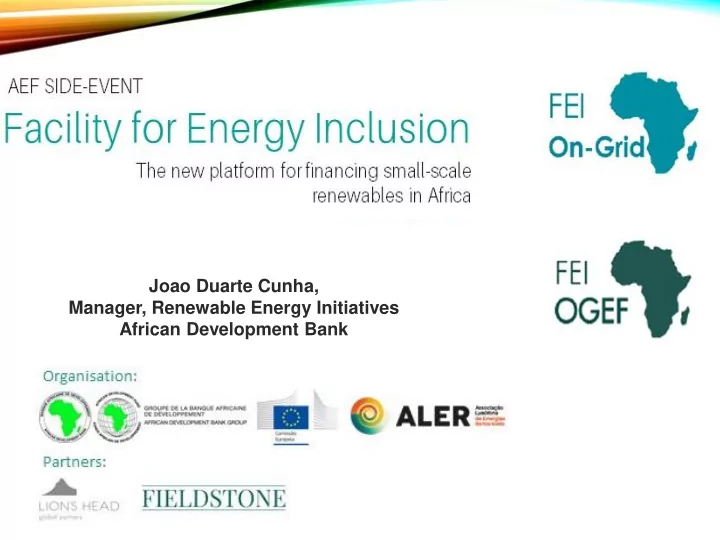

Joao Duarte Cunha, Manager, Renewable Energy Initiatives African Development Bank
Access to electricity is the largest bottleneck to development in Africa… The IEA’s New Policies Scenario projects that approximately 600 million people in Africa will remain without access to electricity in 2030. Africa Source: Energy Access Outlook 2017, International Energy Agency (IEA)
…AfDB has made lighting and powering Africa its top corporate priority! The New Deal on Energy for Africa is AfDB’s strategy for delivering universal energy access in 2025-30, and focused on the deployment of renewable energy. On-grid Off-grid On-grid transmission & Access to clean generation to generation to distribution that cooking energy add 75 million add 160 GW of will create 130 for 150 million new new capacity million new households connections connections AfDB has pledged to commit USD 12 billion of its own resources by 2020, to leverage another USD 50 billion .
Africa has unique potential and the renewable energy investment landscape is diverse and fast-evolving Domestic and Commercial and Community Mini- Utility-Scale Power Micro-Enterprise Industrial Grids Plants • • • • Fast growing Increasingly New technologies Smaller plants easier renewable energy recognized as a enabling to finance and deploy, segment, new large and attractive electrification in advent of solar tenders business models investment segment remote areas • • • • Growth driven sales Displacement of high Power for domestic Clean power in the volumes, cross- diesel costs, stability and non-domestic grids at competitive users (“grid - selling of appliances of supply, tariffs, but experience”) and consumer affordability intermittency an issue finance • • • • Funded by venture Funded by Funded by donor Funded by DFIs and capital, private specialized funds grants and some commercial “impact” equity equity, large Banks corporates investors
Renewable energy and mobile connectivity are redefining the energy access landscape in Africa … Note: Inclusion is for illustrative purposes only and does not imply neither interest nor endorsement of the African Development Bank.
…while improving food security and increase climate resilience in rural areas. Note: Inclusion is for illustrative purposes only and does not imply neither interest nor endorsement of the African Development Bank.
Despite the opportunity, various challenges stand on the way of financing small- scale renewables… Local banks are best placed to finance small-scale projects but do not do it for a variety of reasons including: Inflexible Lending Model Structuring Capacity New business models • Very traditional secured • Limited in-house • Small scale projects viewed corporate lending model experience and range of as “exotic” and debt products “ unbankable ” • Only accept hard assets as collateral • Rigid and narrowly focused • Level of upfront effort does credit approval processes not seem to be justified Acknowledging these challenges, AfDB provided a $100m anchor investment to establish a financing platform for small-scale projects with the objectives of: o aggregating and blending capital from various sources o play a lead arranger role structuring bankable projects o accelerating delivery to increase access to clean energy across Africa
Facility for Energy Inclusion (FEI) $500 million debt platform for small-scale renewables • On-Grid Window (USD 400m): small-scale IPPs, green mini-grids, commercial & industrial solar (size <25 MW) • Off-Grid Window (USD 100m): off-grid solar companies using pay-as-you-go technologies or lease-to-own models
Thank you…on behalf of our partners! Joao Duarte Cunha j.cunha@afdb.org
Recommend
More recommend